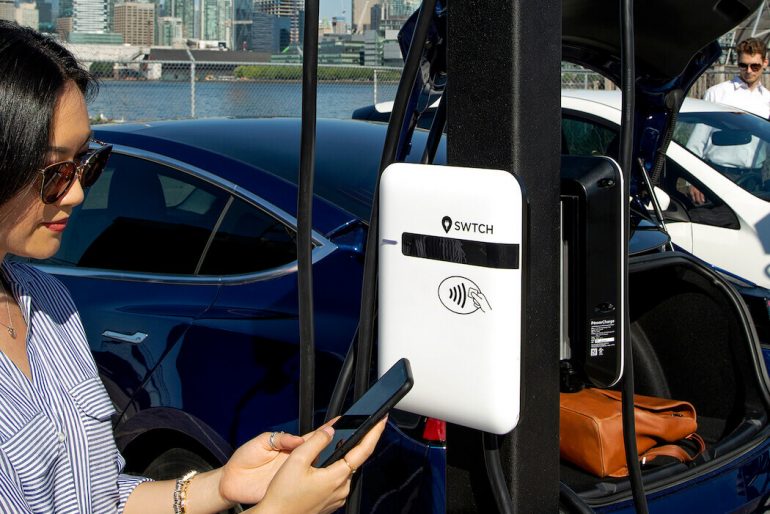Toronto-based SWTCH Energy has partnered with Opus One Solutions to implement a blockchain-based electric vehicle (EV) charging management platform, which will be launched in Toronto.
The partnership includes a $1 million investment from the Natural Resources Canada (NRC) Electric Vehicle Infrastructure Demonstration program, with total contributions towards the project from SWTCH, Opus One, and the NRC totalling $2.6 million.
“Our blockchain-based solution is poised to deliver the greatest value to all stakeholders involved in integrating EVs into the distributed energy ecosystem.”
SWTCH and Opus One’s blockchain-based EV charging management platform is designed to reduce the transactional energy (TE) cost of EV charging and enhance grid efficiency. TE is a scalable energy management system and grid management networked environment. It can manage millions of control points, such as EV charging stations, that generate power and allow communication between supply and demand points, to maintain a balance within the power grid and negotiate virtual energy contracts.
The partnership between SWTCH and Opus One will integrate TE networks that leverage EVs as electricity-producing and storage resources. They will be connected to a distribution system using two-way vehicle-to-grid charging, which allows for energy to be sent back to the grid and blockchain technology. This approach allows power networks to use both location and time-specific price signals, generated by the marketplace.
SWTCH and Opus One stated a goal of the initiative is to leverage blockchain and vehicle-to-grid charging within TE networks to reduce costs of EV charging. SWTCH and Opus One will launch the platform in Toronto. The companies also have plans to expand nationally and internationally.
Founded in 2016, SWTCH provides end-to-end charging and energy management solutions for high-density urban settings. In August, the startup raised a $1.1 million CAD seed round to expand its charging network across North America. SWTCH also pulled in more than $1 million in revenue in 2019. SWTCH’s platform is designed to streamline a driver’s charging experience while optimizing usage and revenue for site operators.
RELATED: Invest Ottawa receives $17 million to expand autonomous vehicle test facility
“As electric vehicle adoption grows and our energy systems become increasingly decentralized, our blockchain-based solution is poised to deliver the greatest value to all stakeholders involved in integrating EVs into the distributed energy ecosystem,” said Carter Li, SWTCH CEO. “We’re delighted to partner with Opus to commercialize this unique technology.”
Opus One Solutions operates offices in Toronto and Richmond Hill, Ont., along with international offices in New York and Glasgow. Founded in 2011, the startup’s GridOS platform is designed to optimize complex power flows to deliver real-time energy management. The platform also helps deliver integrated planning to utilities and other managers of distributed energy assets. GridOS also facilitates the management of microgrids for homes, businesses, and communities.
“We are thrilled to partner with another Canadian cleantech company to expand our transactive energy platform into the world of electric vehicles and to enable decarbonization in the transportation industry,” said Hari Subramaniam, chief of strategic growth for Opus One Solutions.
The University of Waterloo’s Cheriton School of Computer Science was an additional academic collaborator on the project. Headed by Srinivasan Keshav, the research group contributed its experience in adapting blockchain-based computer networking to large-scale problems in energy systems to the platform.


